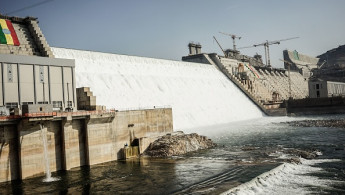Egypt's stance towards Ethiopia over GERD remains uncertain as talks reach deadlock
Egypt may no longer be rhetorically called "the gift of the Nile" after official attempts to mitigate the repercussions of the long-contentious Grand Ethiopian Renaissance Dam (GERD) on the country's water security have seemingly failed.
As the fifth and final filling of GERD nears, a massive hydropower plant on the River Nile that authorities argue gravely threatens Egypt's livelihood, negotiations between Cairo and Addis Ababa seem to have reached an impasse.
An Egyptian intelligence official told The New Arab that "the GERD file has almost been closed after all talks failed due to Ethiopia's intransigence."
"Even though Addis Ababa showed no resilience, a military action against Ethiopia to halt the operations of the dam has not been decided yet," the high-level source added, on condition of anonymity for not being authorised to talk to the media.
No way out
The file of the GERD has been handled over the years jointly by Egyptian intelligence agencies and the country's foreign ministry.
"Countries contributing to the Ethiopian project, especially the UAE, have clearly warned Egypt against taking any hostile action towards the dam," the source noted.
"The Egyptian regime currently deals with the situation in terms of damage control until further notice," the intelligence official added.
Ethiopia has been building the dam since 2011 despite the opposition of the downstream neighbours, Sudan and Egypt, who view the project as a threat to their historically rightful share of the Nile waters. Work on the dam began in July 2020.
Ethiopia has frequently refused to reach a deal with Egypt and Sudan, insisting only on guidelines that can be adjusted at its disposal.
In recent years, negotiations between Egypt and Sudan, on the one hand, and Ethiopia on the other, have reached a deadlock. Both sides trade blame and fail to find common ground amidst Addis Ababa's insistence to proceed with the promising project expected to generate power that almost half of the country's population is deprived of.
Around 90 per cent of Egypt's water comes from the Nile and 85 per cent of this from the Blue Nile, prompting Egypt to worry the dam will severely reduce the amount of Nile water reaching its territory. Egyptian authorities have argued that the dam will cause drought and impact crop production for its population of nearly 106 million.
Observers, however, rule out a military action amid security challenges already facing Egypt—mainly the Israeli ongoing onslaught on Gaza bordering North Sinai province and the civil war in neighbouring Sudan.
"The fifth filling of the dam will definitely impact Egypt's share of water; and it is believed to be ready to store water as of next month with an estimated amount of 23 billion cubic metres, which is a huge portion for one year," according to Abbas Sharaky, professor of irrigation and water resources at Cairo University.
"Egypt receives about 33 billion cubic metres of water a year. Every cubic metre of water filled in the dam is taken out of the water that was supposed to reach Egypt," Sharaky told MBC Misr's talk show host Amr Adeeb earlier last week.
"Had it been filled gradually over several years, Egypt wouldn't have been negatively affected," he argued.
An indecisive stance
As the prospect of any breakthrough in talks, meanwhile, remains unclear, Egypt has sought alternative means to facilitate war including the treatment of wastewater, seawater, and the Aswan High Dam.
"Had it not been for the Aswan High Dam, Egypt wouldn’t have managed to maintain planting [basic] crops," Sharaky said.
Earlier last month, Egyptian President Abdel Fattah al-Sisi publicly said, "The Ethiopian government had been demanded during over 10 years to… show good faith and reach a legally binding agreement ensuring the current and future generations rights of the coming generations in the three countries."
In his speech before the China-Arab States Cooperation Forum, Sisi described the situation as "an existential threat" to the country's national security, saying, "Egypt will not allow whatever tampers without our people and their stability and security."
In recent years, Sisi repeatedly hinted at going to war with Ethiopia, naming water a strategic "red line" and a "security threat."
Similarly, Egypt's former Minister of Irrigation and Water Resources, Mohamed Nasr El-Din Allam, voiced pessimism. "Egypt’s situation does not reflect positive signs as Cairo does not have any leverage against Addis Ababa as it continued to fill the reservoir of the dam," Allam told TNA.
"International laws commit Ethiopia to present to the mainstream countries, Egypt and Sudan, detailed technical reports, which has never been the case," he noted.





 Follow the Middle East's top stories in English at The New Arab on Google News
Follow the Middle East's top stories in English at The New Arab on Google News


